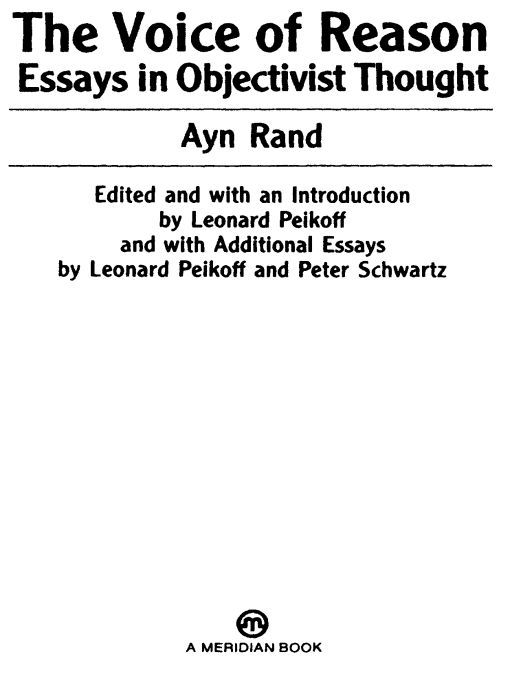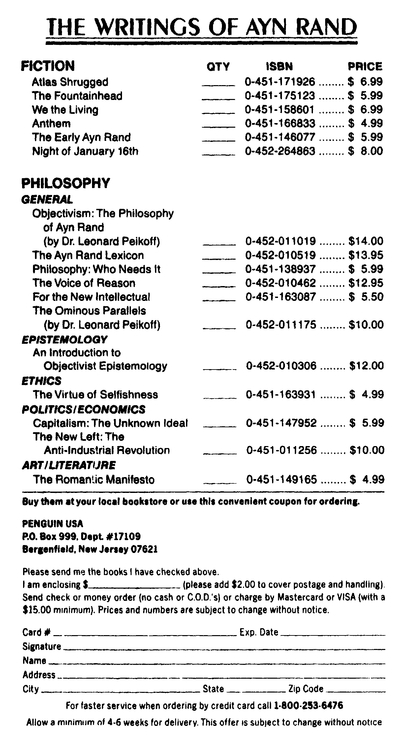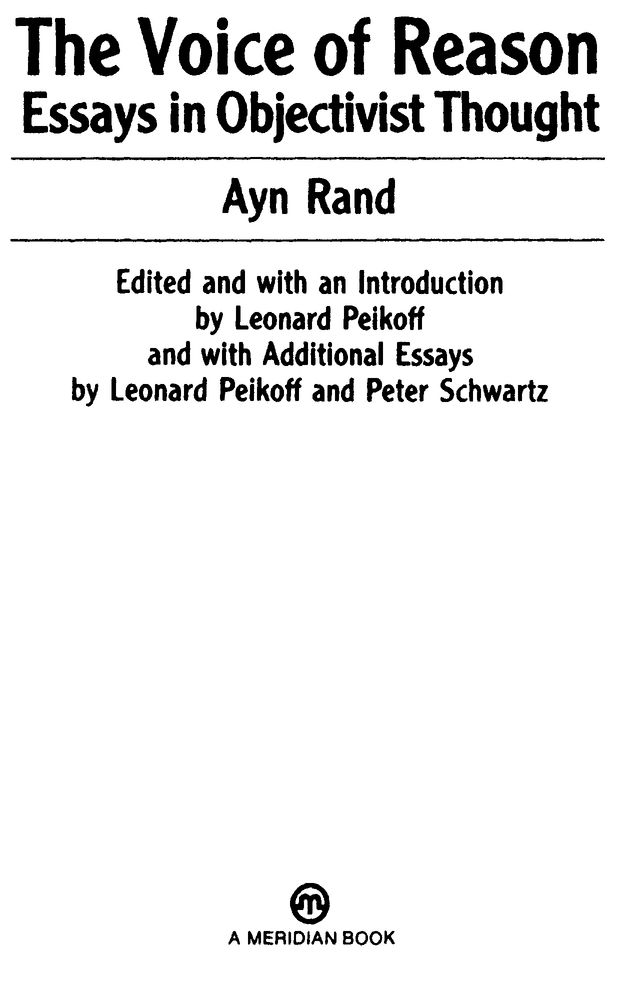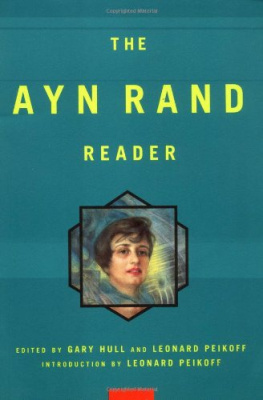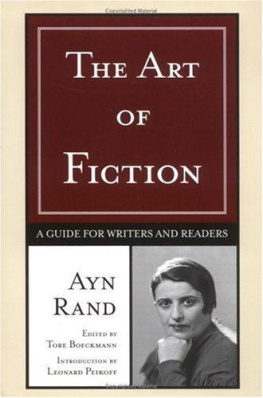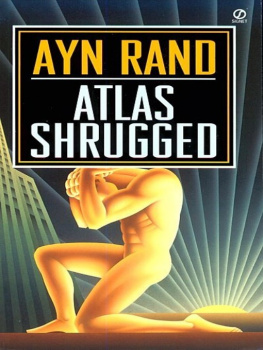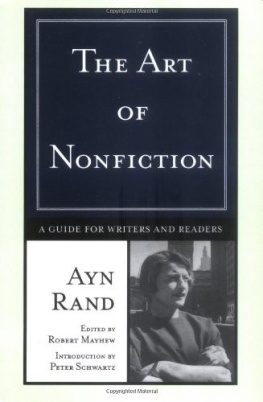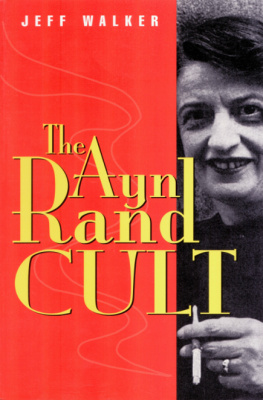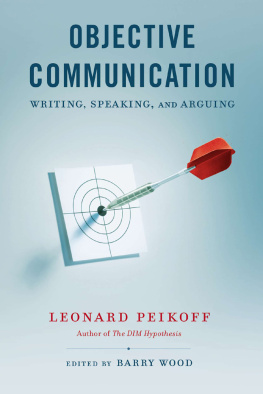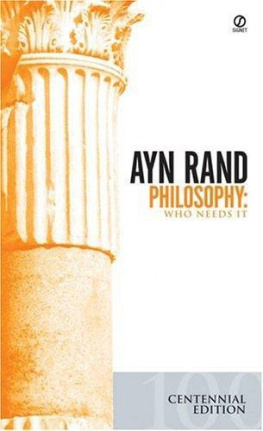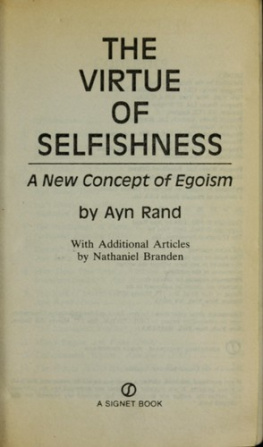Table of Contents
AYN RAND ON:
Objectivism: A book salesman asked me whether I could present the essence of my philosophy while standing on one foot. I did, as follows: 1. Metaphysics: Objective Reality. 2. Epistemology: Reason. 3. Ethics: Self-interest. 4. Politics: Capitalism. (Introducing Objectivism)
The Vietnam War: It was a shameful war ... because it served no national interest, because we had nothing to gain from it, because the lives and heroism of thousands of American soldiers were sacrificed in pure compliance with the ethics of altruism, selflessly and senselessly. (The Lessons of Vietnam)
The Death of Marilyn Monroe: Anyone who ever felt resentment against the good for being good and has given voice to it, is the murderer of Marilyn Monroe. (Through Your Most Grievous Fault)
Apollo 11: For once, if only for seven minutes, the worst among those who saw the lift-off had to feelnot How small is man by the side of the Grand Canyon!but How great is man and how safe is nature when he conquers it! (Apollo 11)
DR. LEONARD PEIKOFF worked closely with Ayn Rand for many years and was designated by her as heir to her estate. He has taught philosophy at Hunter College, Long Island University, and New York University, and he lectures on Ayn Rands philosophy throughout the country. Dr. Peikoff is the author of The Ominous Parallels: The End of Freedom in America (Mentor), and the editor of The Early Ayn Rand (Signet).
Introduction
This is the final collection of Ayn Rands articles and speeches that I plan to publish. It may be regarded as the best of the non-anthologized Ayn Rand. None of the pieces (with one exception) has appeared before in book form.
Some of these twenty-six pieces are brief comments addressed to readers of her newspaper column in the Los Angeles Times or of her own magazines. Others are longer articles from her magazines, or lectures delivered to various kinds of audiences. The material spans a period of twenty years, from 1961, when she gave the first of her annual talks at the Ford Hall Forum in Boston, to 1981, when she gave what was to be her last talk, to a businessmens group in New Orleans.
I have also included six essays written after Miss Rands death in 1982: five are the Ford Hall Forum talks I have been giving in her stead in recent years. The sixth is an article by Peter Schwartz, editor of The Intellectual Activist, a publication that covers current events from an Objectivist viewpoint.
The contents of this book vary widely in scope and subject matter. As the subtitle indicates, however, all are essays in Objectivist thought. That is, all take as their frame of reference Ayn Rands unique philosophy of Objectivism. Objectivism upholds capitalism in politics, on the basis of egoism in ethics, on the basis of reason in epistemology. Everything in this book, accordingly, is an application of this last tenet, which is the root and essence of Objectivism. If one accepts reasonin its full, philosophical definition and implicationsall the rest follows. Thus the title of the present collection.
The culture of our time, a legacy of two centuries of Kantian-ism, is shaped by the opposite ideas; it is a product of mysticism, altruism, collectivism. All around us we see rebels against the Enlightenment, who openly avow their disdain for the mindin favor of brain-drowning drugs or obedience to the State or cults urging back to nature or back to the Bible. In this kind of era, there is only one true rebel: the man or woman who challenges the root of the evil sweeping the world, i.e., the radical who champions reason.
Reason is mans faculty of integrating sensory data into concepts, and thereby of expanding incalculably the power of his consciousness. Such integration is mans distinctive method of cognition and the source of all his achievements: it is his only means of understanding and dealing with the facts of reality. The mind, in other words, is a practical attribute, the most practical one we possess. Reason is mans basic means of survival.
A faculty so vital cannot be compromised or sabotaged with impunity. It cannot perform its life-sustaining function if it is treated as an occasional indulgence alternating with bouts of divine revelation or the equivalent. It must be identified as the essential principle of human existence, then upheld as an absolute.
Human virtue, in the Objectivist approach, consists not in faith or social conformity or arbitrary emotion, but in thought, objectivity, rationality, the relentless exercise of ones intelligence in the task of achieving the values, spiritual and material, which human life requires. Thus Ayn Rands ethics of rational self-interest. If such rationality is to be possible, however, the individual must be treated as a sovereign agent and left unmolested by physical force; he must be left free to think and then to act on his own best judgment. Thus Ayn Rands defense of the original American system of government, the system founded on the recognition of mans inalienable individual rights.
Ayn Rand came to the United States from Soviet Russia in 1926, at the age of twenty-one. The founding principles of the United States, she thought, made it the greatest country in history and the exact opposite of Russia, which she hated. In many ways the United States lived up to her expectations. She found here the freedom to write and speak; she became famous as a champion of individualism; she met her husband, Frank OConnor, whom she loved for fifty years. Intellectually, however, the United States was a disappointment. When she arrived, the intellectuals were on the threshold of what is now called the Red Decade. They were increasingly skeptical about the efficacy of reason, and they were, to her, astonishingly anti-American. At first, she could hardly believe that in the bastion of capitalism (as she had imagined it to be), she was hearing everywhere the same fundamental ideas that she had heard in Russia, the very ideas from which she had run for her life.
She had no choice but to fight the trend. She had seen what it led to, including the expropriation of her fathers business under Lenin and, later, the death of her family under Stalin. She proceeded with every fiber of her being to fight for mans mind and his liberty, and all the major intellectual groups reacted by denouncing her: the liberals attacked her as a reactionary; the conservatives, as a radical; the Communists, as a pro-capitalist; the Church, as an atheist (which she was). By her own choice and conviction, she was miles outside the intellectual mainstreamshe was fighting to reverse that mainstreamand there was no influential group anywhere to act as her ally.
No group perhaps, but the American people, from whom she received an outpouring of admiration. I have read her fan mail through the years, from soldiers and physicians and dancers and CEOs and truck drivers and countless solemn teenagers and even some professors and priestsall struggling to thank her for the vision of man and life presented in her novels, a vision that gave them the courage to carry on their own lives at a moment when they desperately needed it. I have seen her being mobbed by students feeling the same response at dozens of college campuses, from Harvard, Yale and Princeton on down. I have seen the lines of people waiting in the sometimes bitter Boston cold for ten hours or more until the doors to the lecture hall would open and her Ford Hall speech begin. Ayn Rand offered people something they could not get elsewhere, and in return they gave her love, awe, wealth. From the intellectuals, however, she evoked for the most part the opposite: hatred.

